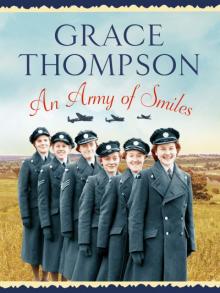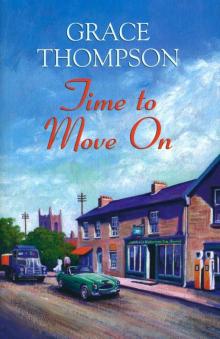- Home
- Grace Thompson
Facing the World
Facing the World Read online
Facing the World
Grace Thompson
Contents
Title Page
Chapter One
Chapter Two
Chapter Three
Chapter Four
Chapter Five
Chapter Six
Chapter Seven
Chapter Eight
Chapter Nine
Chapter Ten
Chapter Eleven
Chapter Twelve
By the Same Author
Copyright
Chapter One
THE SMALL GROUP of onlookers moved aside as two vans drove slowly through the double gates and over to the factory entrance. Today the demolition would begin. What had once been a business making kitchens and small items of furniture would disappear and houses would replace it. Two years since it closed and as the heavy machinery arrived all hope of its reopening had gone.
Although the work hadn’t yet begun, the place already had that dejected air of defeat. The walls had become stained with mildew and paint was peeling from its walls. Guttering had become disconnected and formed a crazy pattern of zig-zag lines.
Sally Travis arrived later than the rest and looked around at the sad faces, aware of the disappointment the final end to their dreams was bringing. So much had changed in the small community of Tre Melin since the factory had closed. It had employed so many of the local people and the effect had been wider than imagined, with two shops closing, and local deliveries of fish and other commodities sold from a van reduced to once in two weeks instead of more frequently. Even the community centre was closed for much of the time as, with less money about, fewer activities were arranged. Bus routes had been changed as fewer people went into the nearest town to shop or to meet friends for coffee. Once-familiar faces were missing as families had moved away to where employment was offered. Others had found less well-paid jobs, but many had refused to accept work that was different from the occupation they had known, and spent their time wasting day after day, unwilling – or too lazy – to seek another situation. For them, the dream of the place reopening was gone now the demolition was about to begin.
Although I didn’t work there, the changes were just as dramatic for me, Sally thought, although I can see an end to my two years of waiting. Holding the handle of Sadie’s pram, she watched with the rest, her thoughts too on the sad end to the factory, but she was thinking specifically of Valmai and Gwilym Martin, and their absent son, Rhys. Gwilym had suffered a serious accident soon after the closure and hadn’t walked since and their son, Rhys, had run away, leaving her to cope with the birth of Sadie and the gossip that entailed. Soon their daughter would be two years old and she wondered whether Rhys would mark the occasion with a visit.
Valmai Martin stood with her neighbour, Netta Prosser, and Eric Thomas, and others who were reminiscing about the years of full employment the factory had given them.
Sally overheard Valmai say to Netta, ‘Some managed to find other work, mind, but not your Walter. Given up trying, he has, hasn’t he?’
‘We manage on what I earn,’ Netta said, ‘but I sometimes wish I’d stopped working when Walter lost his job. That way he’d have had to find work. All he does now is flop about and moan about how unfair life is.’
‘Gwilym had an excuse really, him being so badly injured.’
‘Maybe, but many have managed to cope with worse than losing a leg, Valmai. Let’s be honest here, your Gwilym and my Walter gave up trying. Even poor Eric managed better than them. He worked until he was too old. Bless him.’
Valmai reluctantly agreed. Gwilym and Eric had both been injured in a road accident. Eric had been left with a limp and a weak ankle but Gwilym had been more unfortunate and lost part of a leg. Although help was available, Gwilym hadn’t been out of the house since, refusing to be seen in a wheelchair and even more determined not to use crutches. No pleading or lecturing or downright anger had made him change his mind.
Sally turned away from their discussion as the group was pushed aside. A huge lorry loaded with tools, followed by a crane, made its way through the entrance and stopped close to the factory wall. Men shouted instructions and vehicles moved around the area. Then a man carrying a clipboard and wearing a hard hat came towards them.
‘Sorry, ladies and gentlemen, but I have to ask you to move away. There’ll be a lot of coming and going soon and we don’t want anyone hurt.’
David Gorse – another ex-employee of the factory – was just passing and he stopped and came to join Sally as the man began edging them back on to the road, his arms spread as he coaxed them to leave. ‘Like a shepherd herding reluctant sheep,’ Valmai muttered.
‘Hello, Sally,’ David said. ‘How’s little Sadie today? Starting on the demolition, I see. I hope they can sleep nights!’ David stood beside Sally and gave the little girl a small chocolate bar.
‘Thanks, David, but you shouldn’t spoil her.’
‘It’s a pleasure, she’s a lovely little girl. Her father is missing so much, isn’t he?’
Sally didn’t reply. People were always prying, trying to guess who the father could be – or have their guesses confirmed – but she refused to satisfy their curiosity. One day they would know and that day wasn’t too far away now. Two long years were almost over.
The small crowd dispersed, Eric heading for the old watermill where he was sleeping that week, having spent his rent money on new shoes and a few extra clothes. David walked a little way with Sally, holding Sadie’s pushchair, leaning over, talking to the child. Then Valmai said, ‘We’d better get on, Sally, love, Gwilym will be wondering what’s happened to us. I’ve got the leeks I promised you. The last of them unfortunately. Stay for a bit of lunch, will you?’
‘Just a quick cup of tea. I have to be at Mrs Glover’s in half an hour. She has some extra cleaning for me this week.’
Reluctantly David waved goodbye to Sadie, now smeared with chocolate, and promised, ‘See you soon, Sally,’ to which Sally gave a vague reply.
‘He means well, but I do wish he wouldn’t keep appearing. I don’t have time for company these days,’ Sally whispered as she turned the pushchair for Sadie’s final wave.
‘I think Eric’s sleeping in the mill again,’ Netta said as she caught up with them. ‘Guilty I am, poor man, but I don’t have a spare room.’
‘Neither do we,’ Valmai said. ‘Two bedrooms are all we have and you have young Jimmy and I have to keep Rhys’s room ready for when he comes back home.’
Sally said nothing. She hoped that Rhys’s return home would be temporary, just until they could find a home, then they would marry and the three of them would be together for always.
Netta also avoided a reply. But the expression on her face suggested that Valmai would wait a long time before her runaway son returned. After two years it was time she faced the fact he was gone for good, unable to face the police and their accusations.
Sally put away the last of the cleaning equipment and gave a sigh. Her daughter was playing in the garden and she always complained when they had to leave Mrs Glover’s house. Three more cleaning jobs before six o’clock, after which she was free to go back to her two modestly furnished rooms. There she would prepare a meal and play with her two-year-old daughter Sadie for an hour before putting her to bed. Then the loneliness was at its worst. Closed in the small living room, the wireless on very low as she listened for any sound from Sadie, watching the hands of the clock move, oh, so slowly, waiting for sleep that would take her away until the morning came. Twelve dark hours before she would see another soul. The winter seemed never to end.
Being the mother of an illegitimate child had cut her off from most of her friends and although many people sympathized, in 1
960 there were still plenty who openly disapproved and relished the opportunity for snide remarks. After the incident that changed everything, she hadn’t told anyone, not even Rhys’s parents, where he was or what he was doing. As far as neighbours knew, she had slept with a stranger who disappeared, leaving her shamed and unable to keep her position in the fashion trade. There was little criticism for the mystery man but plenty for herself.
Sally had worked as a fashion buyer for a chain of department stores but had given up when her daughter was born. Rhys Martin had been a very persuasive lover and although he seemed thrilled at the thought of having a child, he was determined to continue with his plan to train as a teacher. It was something he’d considered for a long time but he’d lacked the confidence to give up a well-paid job. The closing of the factory meant the decision had been made for him – but only because of Sally’s generous support. She had helped financially and more importantly she had helped by denying he was Sadie’s father and coping with the criticism alone.
Sally’s parents had died when she was fourteen and had left her a large sum of money but she had vowed never to touch it, convinced that she would be celebrating their deaths. Then, when Rhys needed money to help him through his studies, it seemed a better way to use the inheritance and she willingly offered to help. She had given up the smart flat she rented and moved to two small rooms. Then it had all gone wrong.
A spate of burglaries had taken place around the area and Rhys had come to her late one night explaining that he had to get away.
‘I can’t tell you why but I know they’ll accuse me. If there’s any suspicion of criminality I’ll lose my place at college.’
‘But that’s ridiculous! Why would they suspect you?’ She stared at him. ‘You aren’t involved, are you?’
‘I promise I’ve had nothing to do with any of it.’
‘Then why run away?’
‘Someone will tell a different story from mine so I have to go. Please, don’t tell anyone where I am. I’ve told Mam and Dad I’ve lost my place and I’m going to try to get into drama school.’
He had refused to explain further and she was filled with doubts, but on the following day the police had called and questioned her and she was convinced he had been right to leave.
The baby’s birth had been a terrible time with few offers of help and plenty of unpleasant remarks. Only Valmai supported her. Sally knew she suspected the baby was Rhys’s but had never confirmed her suspicions.
Since a brief and secret visit, soon after the birth, to see Sadie and reassure her of his love, Sally had seen him rarely and only at night when he would come to the back door after a given signal. She had kept to her word and helped him financially but alone she’d had to face the hardships of work and the unkind remarks of people who had once respected her.
Her money was vastly reduced and she was thankful that the period of Rhys’s absence was almost over. In July, he would have finished his exams and surely then he would at last come home and face the critics as she had done for more than two years?
She had needed to work, and had to work where she could take her child. Cleaning other people’s houses seemed the best solution and she had succeeded in building a business doing weekly cleaning, for business people mainly, people she rarely saw.
Mrs Glover was an exception. She had never worked and had always enjoyed running the home she had shared with her husband and their children. Now widowed, and with the children moved on, she welcomed the weekly visit of Sally and her small daughter. She happily cared for Sadie while Sally cleaned.
Tomorrow was Tuesday, a day Sally went to the butchers and a day she dreaded. It was always busy at the time she was able to call and there were often a few who made some remark on her single mother state, even after more than two years. She shrugged the thought aside. Better to enjoy today and worry about tomorrow when it came. She cheered herself by remembering that it was only a few more months before Rhys came home and everything would be out in the open.
The rooms where she lived were in School Lane in a house owned by Mr and Mrs Falconer. She had the use of the bathroom and the kitchen, the times arranged and strictly adhered to with the help of a washing bowl in the corner and an outside lavatory – which she hated, being dark, and with a collection of spiders’ webs which she hadn’t dared to brush away. She could cope with most things after years of being on her own, but not spiders!
The butcher’s shop looked empty and she gave a sigh of relief as she went in and placed her order. The doorbell tinkled and she held her breath, afraid of hearing the voice of one of her critics. The continuing conversation told her there were several people entering. Her heart began to race and the temptation to leave, to come back later, was strong. She didn’t move: there would be no time later, she would be busy all day. To her consternation a voice said loudly, ‘There’s pretty that little girl is getting, Miss Travis.’
‘Thank you,’ Sally whispered.
‘Dark hair she’s got. Like her father’s, is it? Or didn’t he take his hat off?’
A few people laughed in an embarrassed way and Sally felt her face redden.
‘Enough, Milly Sewell,’ muttered the butcher, ‘or you’ll have to go into town for your meat. Right?’ He gave Sally her order and whispered, ‘A couple of sausages and a few pieces of liver. Not a word, mind.’ He took the money for the other items and she smiled and nodded her thanks.
Pushing the pram, she went back to the rooms, put the meat in the pantry and went straight out for her third job that day. Thank goodness it was the flat above the post office where she didn’t have to see anyone. If only Rhys could come home. He’d soon stop the gossips.
Mrs Davy was waiting for her and she braced herself for complaint. Kindly but over fussy, she sometimes reminded Sally of the occasional jobs that needed doing.
‘Sorry I am to give you extra, dear, but when you’ve finished in here would you help me to get some of this rubbish down to the gate for the rubbish collection?’
Hoping it would mean an extra few shillings, Sally agreed. It looked as though Mrs Davy had been emptying her garden shed: broken tools, an old deckchair, rusted paint tins, pieces of worn carpet. She set to with Sadie watching from her pram. It was as she lifted one of the large paint tins and realized it was almost full that the idea came.
‘Mrs Davy, do you think I could take this tin of yellow paint? There’s an outside lavatory that I have to use sometimes and it’s dark and full of spiders. If I could somehow clean it out and paint it I’d be less afraid of going in. I’m sure Mrs Falconer wouldn’t mind, if it didn’t cost her anything.’
‘Of course you can, dear. I’ll ask Eric to drop it off for you. It’s too heavy for you to carry all that way. But how are you going to get rid of the spiders?’
Sally smiled, her blue eyes widening and lighting up her face. ‘I haven’t thought about that yet. This tin of paint could be waiting a long time if I have to do it!’
‘Ask Eric.’
When Eric had lost his job at the closing of the furniture factory, he had just cleared the debts left by his wife when she had walked out on him and taken their daughter Julia. Instead of spending the next few years saving for when he retired, he had been unable to find another opening for a carpenter and had managed for a while doing odd jobs – many of which he did for nothing – but now he lived on a small pension. He lived in a room in a rather neglected boarding house with only a small stove to both heat the place and on which to cook his meals.
Just before the factory closed he had been cycling home with Rhys’s father, Gwilym Martin, when a lorry knocked them down. Gwilym had lost a part of his leg but he had been more fortunate and apart from a limp from a damaged ankle he had little of which to complain. The room at Mrs Godfrey’s was damp and inconveniently situated on the top floor, thirty-five stairs plus the outside steps leading to the front door, but he never moaned about his misfortunes.
He often wondered about his wife and daughte
r but after all the years that had passed he no longer tried to find them. He was sad to have missed watching Julia grow from a baby into a young woman and hoped that wherever she was she had been happy.
He was a pleasant man, friend to all and always willing to help with tasks needing an extra pair of hands. With little to do he spent many hours each day wandering around the village, stopping to chat here and there and calling occasionally to scrounge a cup of tea and a bite to eat. Calls to Rhys’s parents, Valmai and Gwilym, were a regular part of his week. One of his delights was when he met Sally and little Sadie in the park feeding the ducks.
It was several days after the paint had arrived before Sally asked permission to paint the dismal place and a few more before she saw Eric and asked for his help. In the middle of March, when the sun shone surprisingly brightly, Eric arrived and Sally, dressed in an overall and trousers and with a towel wrapped around her head, handed him a long-handled brush and the work was begun.
‘You don’t mind if I stand well back, do you?’ she said nervously. ‘I’ve got my running shoes on and I’m ready to flee at the sight of an eight-legged monster coming my way.’
Eric laughed. ‘Go and make us a cup of tea and I’ll get it done in no time.’ Gladly, Sally agreed.
An hour later, Eric declared the battle was won and there wasn’t a spider or a cobweb to be found. Nervously Sally peered inside. She still felt uneasy, jumping when a leaf moved at her feet and an outside branch touched the small open window.
‘You’ll be all right once it’s painted,’ Eric said. ‘Easy to see they’ll be and they’ll keep right away knowing you’re on the warpath with that.’ He laughingly pointed to the brush she carried. ‘When do you plan to start?’
‘Don’t know.’ A shiver of apprehension wriggled through her. ‘If no spiders return in the next few days, maybe I’ll feel brave enough. I have to go to work now and that’s a relief. A reason to forget it for today.’ She shivered again. ‘I get a squiggle down my back even thinking about the creatures.’

 Nothing is Forever
Nothing is Forever Friends and Secrets
Friends and Secrets An Army of Smiles
An Army of Smiles Sophie Street
Sophie Street Gull Island
Gull Island Facing the World
Facing the World The End of a Journey
The End of a Journey Unlocking the Past
Unlocking the Past Goodbye to Dreams
Goodbye to Dreams The Weston Girls
The Weston Girls Paint on the Smiles
Paint on the Smiles Time to Move On
Time to Move On The Runaway
The Runaway